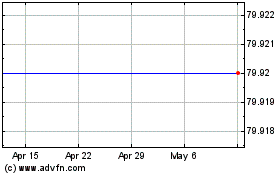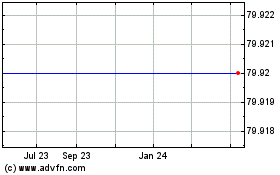By Khadeeja Safdar
This article is being republished as part of our daily
reproduction of WSJ.com articles that also appeared in the U.S.
print edition of The Wall Street Journal (March 22, 2019).
For decades, Leslie Wexner has run the parent of Victoria's
Secret with a close-knit group of directors. But amid scrutiny of
the board's ties to the 81-year-old chief executive, the company is
preparing to bring in some fresh blood.
L Brands Inc. has retained a search firm to find three new board
candidates, according to people familiar with the matter. The
company intends to replace some directors at its May annual meeting
with an eye to increasing board diversity, they said.
The change would come after an activist hedge fund, Barington
Capital Group LP, said this month that L Brands' board members lack
the independence or skills needed to navigate drastic changes in
the lingerie market.
Sales in L Brands' lingerie business have declined as new
competitors cropped up, and the company's stock price has tumbled
by a third from a year ago.
Mr. Wexner built L Brands, which also owns Bath & Body
Works, into a global powerhouse from a single store in Columbus,
Ohio, in 1963. The billionaire businessman, who is also L Brands'
chairman, has drawn heavily from his local ties to populate the
retailer's 12-person board, whose average tenure is 20 years.
Barington, which has a stake of less than 1% in L Brands, urged
the company to add more women and younger directors who are outside
Mr. Wexner's business and social circles. It also called on L
Brands to consider breaking itself apart.
"It is unclear that the board as currently comprised has the
independence to effectively oversee you as chief executive
officer," James A. Mitarotonda, Barington's chief executive, wrote
in a March 5 letter to Mr. Wexner.
Mr. Wexner remains the company's largest individual shareholder,
with a 17% stake. His wife, Abigail, is also on the board, and
neither is independent under the rules of the New York Stock
Exchange. Two additional directors also don't meet the
requirements, including one who acts as a business adviser to the
Wexners.
Though the company classifies the remaining eight directors as
independent, most of them have close ties to the Wexners, Barington
argues. One headed a university to which Mr. Wexner promised $100
million. Another runs a charity that partners with an organization
founded by Mrs. Wexner. One director was formerly employed by Mr.
Wexner at his retail company.
"It's an old-style board with the kinds of interrelationships
you saw many years ago, particularly in certain localities," said
Charles Elson, director of the Weinberg Center for Corporate
Governance at the University of Delaware. "It's surprising that
this kind of board continues to exist in today's climate."
A spokeswoman for L Brands said Mr. Wexner and the other board
members weren't available to comment.
In its proxy filing last year, L Brands said the eight directors
were independent because in the past three years they hadn't worked
for L Brands or received more than $120,000 from it, and they
aren't related to top executives at the company. L Brands said it
evaluates whether a director is independent on a case-by-case
basis.
The average age for L Brands' directors is 71, the youngest
being 57, and seven of them have been on the board for more than a
dozen years. The median age of a director at S&P 500 firms is
63.3, while the median tenure is 7.8 years. Three L Brands
directors are women.
"When more than a third of directors have served for more than
nine years, that's when we start to have a little bit of concern,"
said John Roe, head of ISS Analytics, the data intelligence arm of
Institutional Shareholder Services. "The danger is groupthink, or
the reluctance to consider new opinions."
Mr. Wexner, who was behind other mall regulars such as the
Limited, Abercrombie & Fitch and Lane Bryant, bought Victoria's
Secret, consisting of six stores and a catalog, in 1982 for $1
million. He opened hundreds of stores and bet on high-profile
fashion shows featuring supermodels in push-up bras. The formula
served him well. Victoria's Secret, with more than $7 billion in
annual revenue, is the leader in the women's underwear market.
But in 2016, the brand began losing steam as shoppers gravitated
toward more unstructured styles, such as bralettes and sports bras.
Competitors capitalized on the natural trend by emphasizing
unretouched ads and featuring models of different shapes and
sizes.
Victoria's Secret tried to adjust by hiring new leaders and
changing its products. But some of Mr. Wexner's decisions -- such
as eliminating swimwear from stores and continuing to rely on
Edward Razek, his 70-year-old marketing chief -- have emboldened
critics.
L Brands shares closed Wednesday at $28.18. In late 2015, the
stock traded near $100.
--Theo Francis and Elisa Cho contributed to this article.
Write to Khadeeja Safdar at khadeeja.safdar@wsj.com
(END) Dow Jones Newswires
March 22, 2019 02:47 ET (06:47 GMT)
Copyright (c) 2019 Dow Jones & Company, Inc.
LandBridge (NYSE:LB)
Historical Stock Chart
From Jun 2024 to Jul 2024

LandBridge (NYSE:LB)
Historical Stock Chart
From Jul 2023 to Jul 2024
